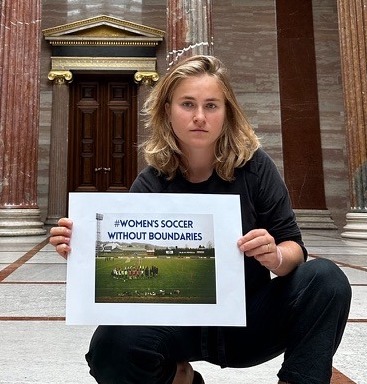
The history of women's football is not only a chronicle of sporting events, but also a fascinating reflection of social change and the ongoing struggle for equality. From its beginnings in England to recent global developments, the journey takes us through an exciting timeline. The dynamics of the sport reflect not only the development of women's football, but also changing social norms and values.
Great Britain, the birthplace of the game, played an important role in the development of women's football in the 19th century. It was not uncommon for girls to play the emerging sport in England's schools. On 23 March 1895, the first recorded women's football match took place between England North and England South. The bizarre anecdote that the players wore hats and skirts, rather than the typical sportswear of the day, illustrates the cultural norms of the time.
Long shadows of oppression
Instead, the promising development of women's football in England came to an abrupt end in 1921. Women were banned from stadiums on the dubious grounds that football was 'unsuitable' for women and should not be promoted. The ban lasted 49 years until 1970, when women were officially allowed to play in stadiums again. This dark period was not only a setback for the game, but also a sad chapter in the history of equality.

The first women's football club was founded in Germany in 1930, but was disbanded after a year following violent protests. During the Nazi era, women were declared ineligible to play football because of their gender role. The German Football Association imposed an official ban on women's football in 1955, which was not lifted until 1970. In Austria, there was a women's football championship as early as 1936, but it was short-lived. The establishment of the women's league of the Austrian Football Association (ÖFB) in 1972 and the official recognition of women's football in 1982 illustrate the uphill struggle for acceptance and equality.
Ode to resistance
Women's resistance to oppression and discrimination in football is an inspiring story. Despite many setbacks and obstacles, the pioneers of women's football have helped to shape the sport we know today. Their determination not only scored goals on the pitch, but also opened doors for future generations of female footballers.

In 2019, a revolutionary moment occurred when the US women's soccer team won the World Cup. In response to discrimination, the team filed a landmark class-action lawsuit against the US Soccer Federation to receive the bonuses they would have received had they been paid according to men's rules. Setting an undisputed precedent for equal treatment, this resistance reverberated throughout the sporting world.
The legal path to equality
The US women's soccer players' lawsuit against the federation was not only a sporting landmark, but also a legal milestone. The fight for equal pay and conditions led to an intense debate about gender equality in sport. Although the case failed in court in May 2020, it set the tone for future discussion and change.

The discussion about equality in women's football covers a number of areas. In addition to financial equality, it is also about equal training opportunities, access to quality pitches, and appropriate support from sponsors and the media. The existing barriers are increasingly recognised and require a joint commitment from sports organisations, the media and society.
The history of women's football is not only a journey through ups and downs, but also a reflection of societal developments. But the current successes and growing recognition point to a promising future. Even if the road to equality is not yet fully paved, the positive developments show that the prospects for women's football are increasingly promising. The development of this fascinating sport is driven by ongoing efforts and the constant fight for equality.
Empowerment through women's football
The increasing visibility of women in football is not only leaving a legacy but also shaping the future of the sport. Young girls look to female players as role models who show them that there are no limits to their dreams. The growing participation of women at all levels of society promises a future where women in sport are recognised and celebrated as a matter of course.
Women's football has enjoyed an amazing resurgence around the world in recent years. International tournaments are becoming more and more popular, and the quality of the game is reflected in the growing number of spectators. Players are increasingly becoming role models, inspiring young girls and consolidating their role as key players in the sport.
A step towards normality
The growing success of women's football at international level is helping the sport to emerge from the shadows and be recognised as a discipline in its own right. The interest of sponsors, media and fans is growing and women's football matches are becoming major events. This global triumph is not only rewarding the players but also signalling social change.

Women's football is a catalyst for social change far beyond the pitch. It is helping to break down gender stereotypes and provide a platform for discussions about equality. From the introduction of fair bonuses to increased media coverage, women's football is actively challenging existing norms and paving the way for a more inclusive sporting landscape.
Women's football as a social statement
The presence of women in football is a symbol of the changing gender roles in society. Sport allows women to raise their voices and fight against prejudice. The active participation of women in football is not only a sporting act, but also a social statement in favour of equality and self-determination.

A look at the past, present and future of women's football shows that it is not just a game, but a powerful tool for change and equality. With each generation of players and fans, the resistance and determination to establish women's football as an integral part of the global sporting culture grows. The journey is far from over, but the path points in a direction of change that extends far beyond the pitch.